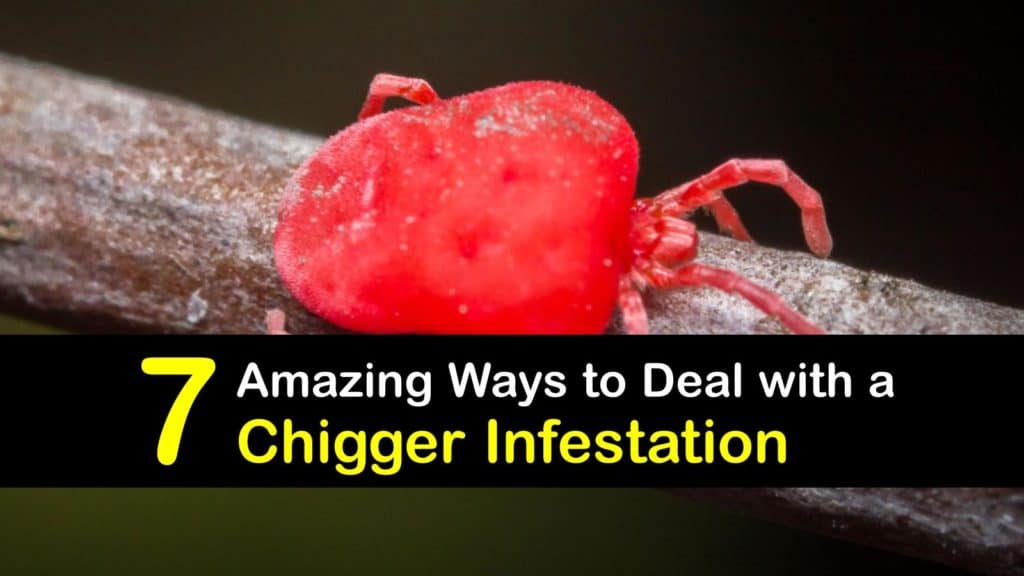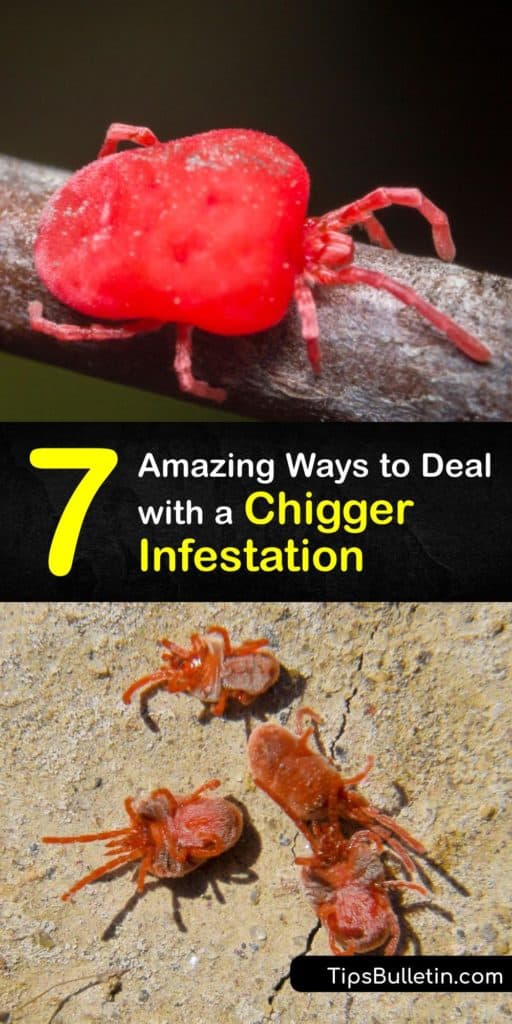Chiggers are the nearly invisible nuisance of nature. A day spent outdoors is meant to be relaxing and enjoyable, not a trip to the doctor for relief from terrible, itching blisters. If you or your family discover small red bumps and welts from bug bites, there is a good chance you have a chigger infestation in your yard.
Immature mites cling to grass and vegetation and wait for a host, such as you or your pet, to stroll through the area. They take the opportunity to migrate onto the skin of your ankles or armpits, where they feed on skin cells, almost unnoticed, for up to four days if undisturbed.
The feeding results in an irritating rash similar to the bites of bed bugs, but chigger bites occur more frequently where your clothing fits tightly. An infestation of chigger larvae is an unpleasant experience that often leaves you covered with calamine lotion to relieve the discomfort.

How to Stop and Prevent a Chigger Infestation
While we all have to coexist with nature, that doesn’t mean we have to subject ourselves to the will of parasites. Fortunately, there are many ways to keep chiggers from hitching a ride on your body while they enjoy an evening meal.
What are Chiggers and Why are They a Pain?
Many pests like to drive you crazy while spending time in the fresh outdoors, from pesky flies to mosquitoes. Chiggers are another problem insect to watch out for as you hike in the woods or play with the kids in the backyard.
Chiggers
Chiggers, or Trombiculidae, go by many names, including red bugs, chigger mites, and scrub mites, and they belong to the family of arthropods. Their life cycle begins as an egg and progresses to the larvae and nymph stage and ends as an adult.
They are orange, red, or yellow and nearly invisible to the naked eye. Chiggers aren’t actually insects, they are arachnids, and larval mites are closely related to ticks.
Adult mites aren’t the ones to watch out for since it’s the larvae that bite. Contrary to what most people believe, they do not burrow in your flesh.

Instead, they latch onto your skin and release digestive enzymes to break down skin cells for feasting, causing intense itching and welts.
Chigger Prevention in the Yard
Hiking trails aren’t the only place chiggers hang out and wait. Your backyard is a prime location for these pests, especially if the conditions are just right. Here are a few chigger prevention methods to keep them out of your yard.
Weeds and tall grass are the perfect hang-out for chiggers, so the best thing to do is to maintain your lawn by mowing it short regularly. Pull weeds or use a weed wacker as soon as you spot them and cut back on excessive vegetation around your yard.
They also enjoy shady, moist spots, so keep the area beneath trees clean by raking up leaf litter to keep from getting rid of chiggers in your house.
For getting rid of chiggers, remove brush piles from around your home and prune landscaping plants to keep them tidy and uninviting to mites. Treat hot spots in your lawn with an insecticide that contains permethrin to eliminate an infestation.
Chigger Control Tips
Chiggers are a common problem, but spending your entire summer indoors is not a healthy solution. Here are some chigger control tips to help you spend time outside without worrying about getting chigger bites.
One of our best chigger control tips or if your yard is to prepare yourself before going outdoors to areas where chiggers and gnats like to congregate. Put on clothing such as long pants, socks, and shoes before heading outside.
Nylons are another excellent option since chiggers cannot bite through the material. Bug spray is also a good tool to keep in your chigger deterrent arsenal.
Choose a brand that contains Deet since these are most effective against chiggers. Spray it over your clothing and skin before going outdoors.
Take a shower once you arrive home if you fear that you came in contact with chiggers. Wash your body with soapy hot water to rinse them away before they get the chance to latch onto your skin, and finish by applying antiseptic to welts.
Ways to Stop a Chigger Infestation with Diatomaceous Earth
One of the ideal ways to stop chiggers from infesting your yard is to use diatomaceous earth. Get rid of chiggers in your yard with this natural powder that not only eliminates these bugs, but it gets rid of other annoying or harmful insects as well. Use it for a spider infested house or ants and roaches indoors and out.
Slip on work gloves and sprinkle diatomaceous earth for chiggers around the perimeter of your yard. Pay special attention to hot spots, such as shady, damp areas, weeds, and tall grass. The chiggers ingest the powder, which eventually leads to dehydration and death.
You can also use DE for earwigs in the house, as well as many other creepy crawlies. It is safe for people and pets.
Natural Ways to Keep Chiggers Out of the Yard
The best way to prevent you, your family, or pets from catching chiggers is to make your yard unattractive to the bugs. Luckily, there are natural remedies that are useful for keeping chiggers out of your lawn.
One of the most beautiful ways to repel chiggers from your yard is to plant flowers. Chiggers cannot stand marigolds, and planting them around your home and areas where these pests hang out, keeps them at bay.
Another thing that they hate is sulfur, and it comes in pellet and powder form. The powder is useful for dusting on your socks or shoes to keep chiggers off your skin, and the pellets work great as a yard repellent. However, do not use these if you have pets.
Making a Homemade Chigger Repellent
While wearing protective clothing is a great way to keep bugs off your skin, this isn’t always enough.
Insect repellents work great to repel chiggers, but many commercial products contain harmful chemicals. This chigger repellent spray is natural and effective at keeping chiggers off your skin.
Mix water, witch hazel, and lavender essential oil in a small container and stir it with a spoon.
If you do not have lavender oil, lemongrass, tea tree, and thyme also work well to repel chiggers. Apply the repellent on exposed areas of your skin before heading outdoors.
Why Do Chigger Bites Itch?
While going through our chigger prevention guide, you probably find yourself wondering why a chigger’s bite causes such irritation and itch. Here is why these pests cause itchy skin but beware, it’s a bit gross.
When a chigger bites into your skin, it releases an enzyme to dissolve skin cells for digestion. The body reacts to the chigger’s saliva, triggering an allergic reaction and histamines that result in a pimple or welt and terrible itching.
The most effective way to combat your reaction to bites is with antihistamines, such as Benadryl. Try not to scratch the rash and apply calamine lotion or hydrocortisone cream to the affected area as needed.
A chigger encounter is no fun, and taking antihistamines and applying hydrocortisone cream are often the only remedies to relieve the rash of chigger bites.
Fortunately, there are ways to avoid a harvest mite problem and prevent the larva from feasting on your skin.

A chigger infestation makes hanging out in the backyard a miserable experience, especially if you have an allergic reaction, so why not share our chigger prevention guide with your outdoor-loving friends and family on Pinterest and Facebook?